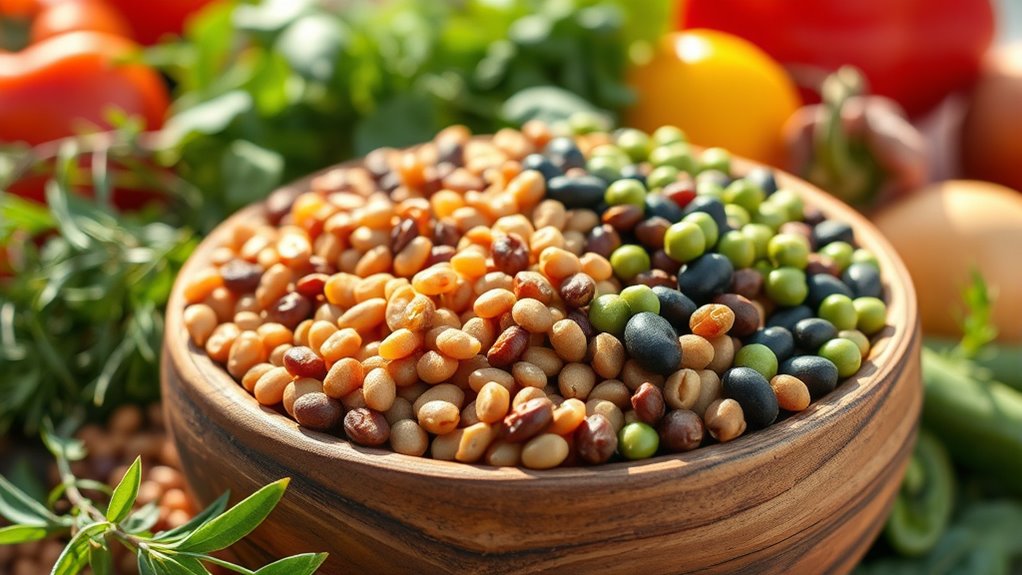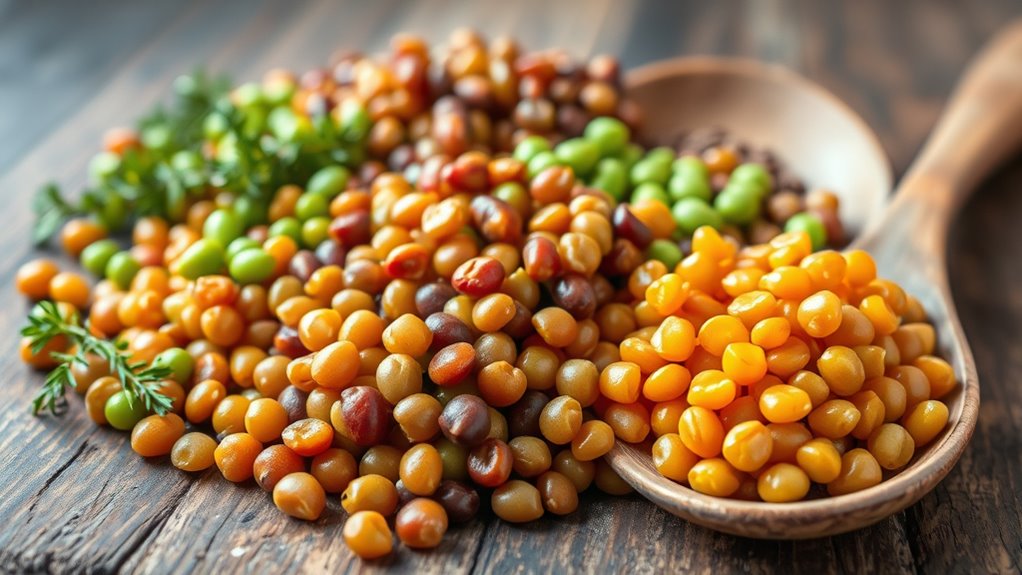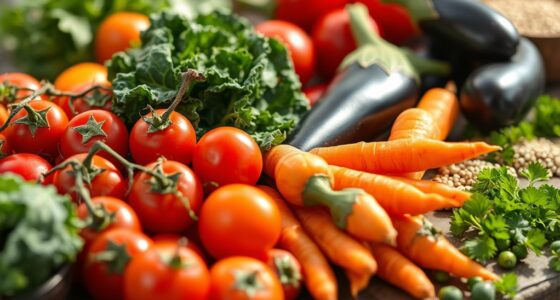Pulses like lentils, beans, and peas are highly nutritious and great for your health. They’re rich in fiber, protein, vitamins, and minerals, which help lower bad cholesterol, improve digestion, and regulate blood sugar. They support heart health, reduce inflammation, and may help prevent chronic diseases. Easy to add to many meals, they’re affordable and versatile. If you want to discover how these superfoods can boost your well-being, explore more.
Key Takeaways
- Pulses like lentils, beans, and peas are rich in plant-based protein, fiber, vitamins, and minerals, supporting overall health.
- They help lower bad cholesterol levels, reducing the risk of heart disease and promoting cardiovascular health.
- Their high fiber content aids digestion, prevents constipation, and boosts immune function.
- Pulses regulate blood sugar levels, helping prevent insulin resistance and diabetes.
- They are affordable, versatile, and easy to incorporate into various meals, enhancing diet quality.

Pulses, which include beans, lentils, chickpeas, and peas, are a powerhouse of nutrition that can substantially boost your health. They pack a high nutritional value, offering essential nutrients like fiber, protein, vitamins, and minerals that your body needs to function *at its best*. Incorporating pulses into your diet can make a *significant* difference in your overall well-being, especially when it comes to maintaining a healthy heart. Their rich content of soluble fiber helps lower bad cholesterol levels, which can reduce the risk of cardiovascular disease. By regularly consuming pulses, you support your heart’s health and improve your chances of avoiding issues like hypertension and atherosclerosis.
The nutritional value of pulses goes beyond just fiber. They are an excellent source of plant-based protein, making them a *key* food for vegetarians and those looking to reduce meat consumption. Their low fat content, combined with healthy fats, helps keep your calorie intake in check while still delivering essential nutrients. Pulses are also rich in complex carbohydrates that release energy slowly, preventing blood sugar spikes and providing sustained energy throughout the day. This balanced nutrient profile supports your overall metabolic health and helps you maintain a healthy weight, which is *essential* for heart health.
Consuming pulses regularly can also improve your digestive health. The high fiber content aids in digestion, prevents constipation, and promotes a healthy gut microbiome. A healthy gut can positively influence your immune system and reduce inflammation, both of which are linked to chronic diseases like heart disease. *Additionally*, pulses contain antioxidant compounds such as polyphenols, which combat oxidative stress and reduce inflammation—a *key* factor in cardiovascular problems. Incorporating pulses into your diet can also contribute to blood sugar regulation, helping prevent spikes that can lead to insulin resistance and diabetes.
Regular pulse intake boosts digestive health, immune function, and reduces inflammation linked to heart disease.
You don’t need to overcomplicate your meals to enjoy the benefits of pulses. Adding beans to salads, preparing lentil soups, or snacking on roasted chickpeas are simple ways to boost your intake. Their versatility makes them easy to incorporate into various dishes and cuisines. Plus, they’re affordable and widely available, making them an accessible option for everyone aiming to improve their diet.
Frequently Asked Questions
Are Pulses Suitable for People With Gluten Allergies?
Yes, pulses are suitable for people with gluten allergies because they naturally contain no gluten. However, you should watch out for cross-contamination during processing or packaging, which could introduce gluten. Always check labels carefully and choose certified gluten-free options to avoid allergy concerns. If you’re unsure, consult with your healthcare provider to ensure pulses fit safely into your diet.
How Do Pulses Affect Blood Sugar Levels?
Think of pulses as gentle guides for your blood sugar regulation, not harsh alarms. They have a low glycemic index, meaning they release sugars slowly into your bloodstream. This helps prevent spikes and crashes, keeping your energy steady. By including lentils, beans, and peas in your diet, you support balanced blood sugar levels and reduce the risk of diabetes. Your body benefits from their steady, sustained energy release.
Can Pulses Help With Weight Management?
Yes, pulses can help you manage weight effectively. They’re rich in fiber, which boosts your fiber intake and promotes feelings of fullness, reducing overeating. Plus, pulses are low in calories, making calorie control easier. Incorporating lentils, beans, and peas into your meals keeps you satisfied longer and supports your weight management goals without sacrificing nutrition. So, adding pulses is a smart move for healthier weight control.
Are There Any Risks of Consuming Too Many Pulses?
You might think eating more pulses keeps you healthy, but overdoing it can cause digestive issues like bloating or gas. Overconsumption risks include nutrient imbalances and potential discomfort, especially if your body isn’t accustomed to high fiber intake. To avoid these problems, balance your diet and introduce pulses gradually. Listening to your body helps prevent digestive troubles and ensures you enjoy their benefits without side effects.
How Do Pulses Compare to Animal Protein Sources?
Pulses are a great plant-based alternative to animal proteins, offering essential nutrients with lower environmental impact. They typically contain less saturated fat and cholesterol, making them healthier for your heart. Compared to animal sources, pulses are more sustainable, requiring less water and emitting fewer greenhouse gases. Incorporating pulses into your diet helps reduce your carbon footprint while providing high-quality protein, fiber, and crucial vitamins.
Conclusion
Incorporating pulses into your diet is like planting seeds for a healthier future. They’re packed with nutrients, fiber, and protein that boost your energy and support your well-being. By choosing lentils, beans, and peas, you’re building a sturdy foundation for better digestion, heart health, and weight management. Think of pulses as the gentle giants of nutrition—small but mighty—ready to help you thrive with every bite. Make them a staple and watch your health blossom.









